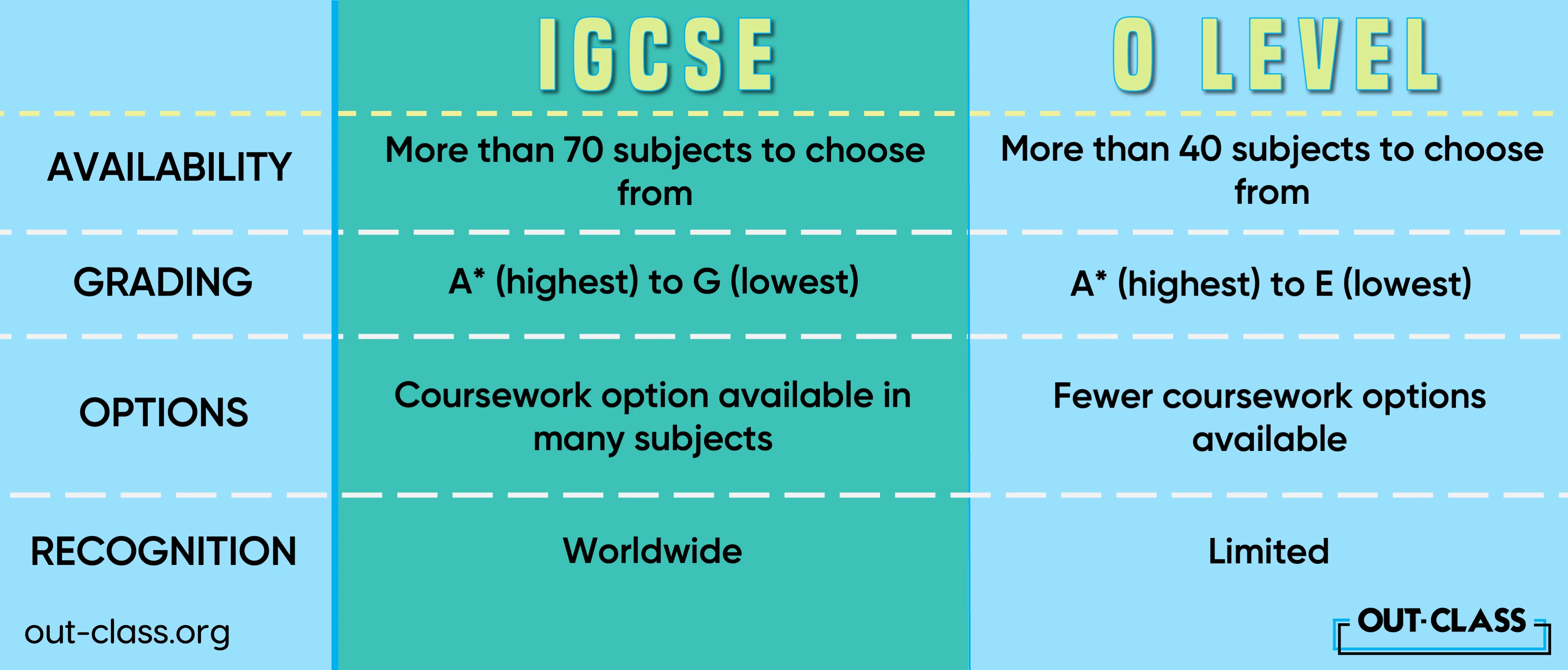Unlocking the distinctions between Cambridge IGCSE and O Level reveals a dynamic educational landscape.
IGCSE caters to diverse abilities, featuring a comprehensive grade spectrum from A* to G, with core and extended curricula flexibility. Its emphasis on varied assessments, including oral and practical skills, fosters holistic development. Conversely, O Level offers grades A* to E, focusing on specific local needs in some syllabuses and streamlined coursework options. Language studies concentrate on writing and reading skills, while the sciences offer practical test constraints, benefiting resource-constrained schools.
Related: O Level Vs IGCSE Vs EdExcel - Which One Is For You?
Let's dive into the real difference between IGCSE and O Level through a look into subject structures.
IGCSE vs. O Level
Mathematics:
Regarding IGCSE vs. O Level Mathematics, the syllabus might dance to a similar tune. Still, the steps on the exam floor differ. While IGCSE Mathematics has the syllabus code 0580, O Level Mathematics has the syllabus code 4024.
For IGCSE:
For IGCSE candidates, it's not just about solving equations; it's about choosing the proper dance – Core or Extended – based on their expected grade. Candidates in the C to G range (expecting below grade D) attempt Papers 1 and 3. In contrast, students with an anticipated grade above C must outwit the Extended syllabus content tested through Papers 2 and 4.
-
Paper 1 (Core): Duration: 1 hour | Marks: 56 | Question Type: Short-answer
-
Paper 3 (Core): Duration: 2 hours | Marks: 104 | Question Type: Structured Questions
-
Paper 2 (Extended): Duration: 1 hour 30 minutes | Marks: 70 | Question Type: Short-answer
-
Paper 4 (Extended): Duration: 2 hours 30 minutes | Marks: 130 | Question Type: Structured Questions
For O Level:
However, O Level brings everyone together on the same exam floor. Students attempt Papers 1 and 2, each determining 50% of the total qualification.
-
Paper 1: Duration: 2 hours | Marks: 80 | Question Type: Short-answer Questions
-
Paper 2: Duration: 2 hours 30 minutes | Marks: 100 | Question Type: Structured Questions
Chemistry:
For IGCSE:
For IGCSE Chemistry, the examination journey unveils two distinct pathways tailored to students' prowess and potential.
Core Candidates, who are expected to achieve a grade of D or below should be entered for Paper 1, Paper 3 and either Paper 5 or Paper 6:
- Paper 1 (Multiple Choice): Duration: 45 minutes | Marks: 40 (30%) | Question Type: 40 four-option Multiple-Choice Questions | Assessment: Externally assessed.
-
Paper 3 (Theory): Duration: 1 hour 15 minutes | Marks: 80 (50%) | Question Type: Short-answer and Structured Questions
Extended Candidates, who are expected to achieve a grade of C or above, should be entered for Paper 2, Paper 4 and either Paper 5 or Paper 6:
-
Paper 2 (Multiple Choice): Duration: 45 minutes | Marks: 40 (30%) | Question Type: 40 four-option Multiple-Choice Questions | Assessment: Externally assessed.
-
Paper 4 (Theory): Duration: 1 hour 15 minutes | Marks: 80 (50%) | Question Type: Short-answer and Structured Questions
For O Level:
For O Level Chemistry, candidates once again dance to a similar examination tune.
-
Paper 1 (Multiple Choice): Duration: 1 hour | Marks: 40 | Question Type: 40 four-option Multiple-Choice Questions
-
Paper 2 (Theory): Duration: 1 hour 45 minutes | Marks: 80 (50%) | Question Type: Short-answer and Structured Questions
-
Paper 3 (Practical Test): Duration: 1 hour 30 minutes | Marks: 40 (20%) | Assessment: Questions on experimental skills in Section 4
-
Paper 4 (Alternative to Practical): Duration: 1 hour | Marks: 40 (20%) | OR: Questions based on experimental skills in Section 4
English:
For IGCSE:
For IGCSE English, all candidates take two papers: Paper 1 and Paper 2 or Component 3.
-
Paper 1 (Reading): Duration: 2 hours | Marks: 80 (50%) | Question Type: Structured and Extended Writing Questions
-
Paper 2 (Directed Writing and Composition): Duration: 2 hours | Marks: 80 (50%) | Question Type: Extended Writing Questions and Composition Task
- Component 3 (Coursework Portfolio): Marks: 80 (50%) | Question Type: Three Internally-assessed, Extended Writing Assignment
However, students of IGCSE English may choose to take Component 4, the Speaking and Listening Test, where marks are separate from written component grades and candidates receive certificates from grades 1 to 5 based on performance. Spanning 10–12 minutes, Component 4’s marks are separately endorsed and internally assessed.
For O Level:
O Level English 1123 students follow a similar rhythm, tackling both Paper 1 and Paper 2, although the structure differs from their counterparts.
-
Paper 1 (Reading): Duration: 2 hours | Marks: 50 (50%) | Question Type: Structured and Extended Writing Questions
-
Paper 2 (Writing): Duration: 2 hours | Marks: 50 (50%) | Question Type: Extended Writing Questions and Composition Task
Wrapping up
Understanding the differences between IGCSE and O Levels is vital for students to make informed choices. While the general distinctions set the stage, it is the subject-specific nuances that truly define the unique character of each qualification. As students navigate the academic landscape, recognizing these variations empowers them to tailor their educational journey according to their goals and aspirations.
Read more: Top Courses 2024 for Students in UAE



